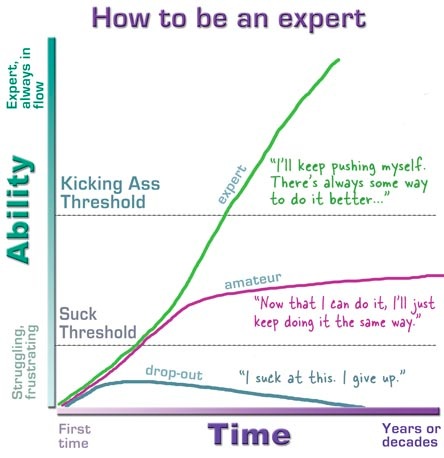
Image Credit:
Posted by: Albert Weng
People tend to feel and express in a way that they don't know a new thing and waiting for someone to rescue, to teach or even, to feed? This is a quite passive attitude that ruins the opportunity to make the process of learning a thing productively. I personally struggled in such situation for quite a long time and suffered from not having the right mind set to learn effectively as I expected, which was then resulted in a situation that forced me to catch up things quicker to avoid being considered a fool!
Over the time I try to learn how people learn effective about approaching or preparing to approach a new thing, or any given new domain of a topic, then a few years ago, I found SACK. A very productive and simple concept to practice and internalize for anyone, especially when you're just about to say to others, or even yourself about "I don't know". Now with SACK, alternatively, you'd probably say, "well, this is something just a little as I know so far, so what's your input?", confidently.
1) Search
Search the Internet, try Google for a different mix of key phrases and read through those more popular or relevant info. This is the first thing you can do yourself to collect the basic idea and input about the subject and summarize those pieces to help the next step, ask for references.
2) Ask
Ask someone who might know or have the experience over the subject, this is not to get the "answer", instead, is to build references of the thing, which is very helpful that you might be able to make your own comment from a kind of expert feedback, and then, to move to the next critical step, check if it's true or false, or maybe, something else.
3) Check
Check for what has learned and summarized, try to verify also if there's missing link/ content, or possible conflict from the data and number against the expert's input. Quite often, this checkup process is the most critical step to really "build" your own knowledge on that subject.
4) Know
Least but not last, know there's always some more to learn by not assuming you already "know" the stuff, even after the above steps you spent. One saying, "the more you learn, the less you'll find yourself actually knowing." This is really the case. By knowing this could be only the first small step into the big new world of that subject, you're then being more open and will be even more keen to learn to become an expert down the road, as I assume myself at all time.
Did you SACK today?

Image via Doug Belshaw
No comments:
Post a Comment